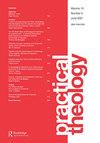Editorial 16-01
IF 0.4
0 RELIGION
引用次数: 0
Abstract
A major change occurs this year in our journal prompted by the decision of the publisher not to limit the size of any issue of the journal. In the past we were given a budget number of pages for each issue and consequently the whole year’s Volume and this restriction is no longer being applied. The only remaining requirement is to publish a minimum number of articles and book reviews each year. The implication of this is that we can publish as many articles as are available as each issue goes to publication, which means the articles will move more quickly to being assigned an issue after being published online. In addition, there is no longer any requirement for ‘double issues’. Therefore, in this issue we publish ten articles and we expect two of our Special issues this year, one on Majority World Epistemologies and the 2022 BIAPT Conference Issue on Embodiment to be substantial as well. We apologise that, due to circumstances beyond our control we are not able to publish any book reviews in this issue. This will be rectified in forthcoming issues throughout the year. Our ten articles fall into two halves. We begin by placing issues of justice to the fore; care of our elders in residential homes; homelessness; gender silencing; and the environmental degradation of the oceans. We pivot with an article addressing time in relation to Christian discipleship into five articles concerned in various ways with the Church and its worship; the attitudes of Polish youth to the Church; inculturation in Eucharistic worship in Pakistan; reflection on online worship in Australia and Indonesia; and lament-driven preaching the Asian-American community. What readers of the journal might be interested to note is we have articles from two theologians within The Salvation Army and two articles studying aspects of the Roman Catholic Church, expressing the great breadth of Christian traditions we embrace in the journal. Perhaps for the first time (and definitely not the last) we have a small minority of the authors hailing from England. There are first-time contributions from a Muslim author in Pakistan, a Korean and two from Indonesia. The Practical Theology Journal is thereby stepping well outside of its origins in Britain and Ireland and this trend will continue in 2023. We begin this issue by publishing the BIAPT article prize winner for 2022, Helen Hindle. This is an outstanding piece of work, both in the original doctoral research (funded, we should note by the Methodist Homes Association) and the summary of it which is presented astutely and with aplomb here. What strikes me powerfully is the way Hindle is able to use the personal experience of a neighbour going into a Care Home as motivational fuel for the research, which leads her to care deeply and even love her research participants in four Care Homes. They are full participants in the research and everyone benefits as a result, there is a proper research ‘holiness’ demonstrated here in the methodology as it is designed and employed. No doubt many of us at some point in our lives will have to deal with a Care Home, either for a relative, friend, neighbour and, possibly ourselves. For such individuals, as well as readers who are Ministers and those of us with public roles Hindle addresses a gap in the theological literature. As she points out there is much theological writing on ageing, much less on the practical issue of designing and delivering care in a residential institution. In engaging with the medieval Anchorite, Julian of Norwich, Hindle is able to draw on a rich resource for her编辑16-01
今年我们的期刊发生了一个重大变化,出版商决定不限制任何一期期刊的规模。过去,我们每期都有一个预算页数,因此全年的卷都有一个预算页数,这一限制不再适用。唯一剩下的要求是每年出版最少数量的文章和书评。这意味着我们可以在每期出版时尽可能多地发表文章,这意味着文章在在线发布后将更快地转移到指定的一期。此外,不再有“双重问题”的要求。因此,在这一期中,我们发表了10篇文章,我们预计今年的两期特刊,一篇关于多数世界认识论,以及2022年BIAPT会议关于体现的问题也将是实质性的。我们很抱歉,由于我们无法控制的情况,我们不能在这一期发表任何书评。这将在全年即将出版的问题中得到纠正。我们的十件物品分成两半。我们首先把正义问题放在首位;在安老院舍照顾长者;无家可归的;性别沉默;以及海洋环境的恶化。我们以一篇论述时间与基督徒门徒训练关系的文章为中心,分成五篇文章,以不同的方式与教会及其敬拜有关;波兰青年对教会的态度;巴基斯坦圣餐崇拜的本土化;对澳大利亚和印度尼西亚网络敬拜的反思;以及对亚裔美国人社区的感伤说教。读者可能会感兴趣的是,我们有两篇来自救世军的神学家的文章,还有两篇研究罗马天主教会的文章,表达了我们在杂志中所接受的基督教传统的广度。也许这是第一次(但绝对不是最后一次),我们有一小部分作者来自英国。其中有来自巴基斯坦的一位穆斯林作家、一位韩国作家和两位印度尼西亚作家的处女作。因此,《实用神学杂志》正在走出它在英国和爱尔兰的发源地,这一趋势将在2023年继续下去。我们首先发表2022年BIAPT文章获奖者海伦·辛德尔(Helen Hindle)。这是一项杰出的工作,无论是在最初的博士研究(我们应该注意到,是由卫理公会家庭协会资助的),还是在这里机敏而沉着地提出的总结。让我印象深刻的是,欣德尔能够利用邻居进入养老院的个人经历作为研究的动力燃料,这使她深深地关心甚至爱着她在四个养老院的研究参与者。他们是研究的完全参与者,每个人都从中受益,在设计和使用的方法论中,有一个适当的研究“圣洁”。毫无疑问,我们中的许多人在生活中的某个时刻将不得不与养老院打交道,要么是为亲戚、朋友、邻居,可能还有我们自己。对于这些人,以及牧师和我们这些有公共角色的读者来说,辛德尔解决了神学文献中的一个空白。正如她所指出的那样,关于老龄化的神学著作很多,而关于设计和提供养老院护理的实际问题就少得多了。在与中世纪隐士诺里奇的朱利安的交往中,辛德尔能够为她吸取丰富的资源
本文章由计算机程序翻译,如有差异,请以英文原文为准。
求助全文
约1分钟内获得全文
求助全文

 求助内容:
求助内容: 应助结果提醒方式:
应助结果提醒方式:


